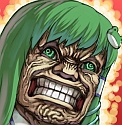|
  The year is 1592 A.D., the 20th year in the Tenshou era. For the past 7 years, Toyotomi Hideyoshi has ruled as Kanpaku and now as Taikou for the glorious Emperor Katahito. Under his leadership, and before, that of his late master Oda Nobunaga’s, the many warring clans and daimyo of Japan have been brought to some measure of stability. But the peace is still unsure. Hundreds of thousands of warriors and samurai roam the land, and without an external enemy to turn to, it is still possible they will turn on each other. To end this trouble, Hideyoshi has decreed that the armies of Japan are to assault the Middle Kingdom, and conquer it for the Chrysanthemum throne. To that object, for several years he has requested the aid of the Joseon king Seonjo, and safe passage through his country. But the Koreans, feeling secure as the younger brother of the Ming Empire, have continued to rebuke the Taikou’s... generous... offer, and are sure of their victory in any possible conflict. The Taikou’s generals and admirals prepare in Kyushu to disabuse them of this conclusion. In Hanseong/Seoul, first capital of Joseon, political factions tear at each other - East vs. West, Greater Northern vs. Lesser Northern - in interminable conflict. Ministerial purges and administrative changes with the succession of each dynast have left the country in a state of persistent disorder, unable to take advantage of political and technological opportunities. The field armies are disorganized, the generals have little practical knowledge of drills and discipline, and by law cannot leave their areas to aid one another without the presence of a senior court-appointed marshal. Only on the seas do they have the advantage, with a strong admiralty and advanced ship-building techniques. Will they be able to defend the kingdom from this aggression? And all the while, the Ming Emperor Wan-li in Peking administers his fatherly rule to all his domains, and receives such due tribute from his kingly sons at his court. It is almost certain that should Joseon request it, the Son of Heaven will stamp his foot, and the armies of all the earth shall rise from the ground to face his foes. It is now April 1 1592, the time for the assault, and over 160,000 Japanese warriors have been gathered on Kyushu and Tsushima in preparation for this campaign. In Korea, 180,000 soldiers spread through fortresses and outposts gird themselves for the conflict. In China, the Ming deal with a major Mongol rebellion in the province of Ningxia to the West, and a war with the Burmese Taungoo Empire in the far South. Whatever happens, it is sure to be that the motto of dead Nobunaga will be fulfilled - 天下布武 - Tenka Fubu, “Spread War to All Under Heaven!” How The Game Will Be Run You, the players, will each take command of a notable person of the era, most likely one of the generals, but also some of the notable civilians, by posting saying so, and providing an email address for me and the other players to contact you by. While I hope the Japanese and Korean forces get filled quickly, if you’d like someone not listed, let me know and we can work it out. Each turn, representing 1 month, you will email me  at ArujeiSA@gmail.com at ArujeiSA@gmail.com  a maximum of 3 orders for your avatar and/or their army(ies), which I will resolve using a combination of dice rolls and black magic. Though most of them will certainly deal with things such as “lay siege to Ulsan,” “pursue General X’s forces and force a battle,” or “prepare defenses along the Yalu river,” don’t be afraid to think outside the box! If you want to engage in diplomacy, save a captured comrade, or something else you can think of, do it! a maximum of 3 orders for your avatar and/or their army(ies), which I will resolve using a combination of dice rolls and black magic. Though most of them will certainly deal with things such as “lay siege to Ulsan,” “pursue General X’s forces and force a battle,” or “prepare defenses along the Yalu river,” don’t be afraid to think outside the box! If you want to engage in diplomacy, save a captured comrade, or something else you can think of, do it!Historical knowledge is welcome, but don’t feel strait-jacketed by it. Furthermore, while fluff in your orders is fine, make sure you’re clear about each objective. Posts in the thread are highly encouraged, be they diplomacy, taunts, intra-faction announcements, poems, speeches, anything! They will be taken into account, and may even affect the black magic used during turn resolution. In your posts, make sure to include your name, and if you have a reasonably-sized picture for your character, please include it. IRC is a very helpful tool, with many of us on the channel #TenkaFubu on SynIRC.irc.net, but #BOP is also a haven. Click here if you’ve never used IRC before. Notable People Japan  Toyotomi Hideyoshi - Taikou and chief minister of the Japanese Emperor, he rose from nothing to being the greatest warlord of his age. His unmatched ambition has brought him a vision of a Japanese Emperor ruling over all the lands under the sky, from the steppes to Southeast Asia. Taken - Cumfart Vortex/vanhelsing420@gmail.com 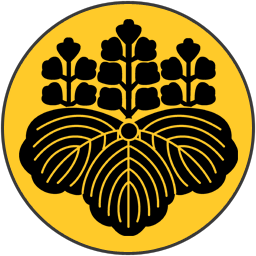 The forces of the Taikou are arranged into 7 divisions (with 2 in reserve on Tsushima, and further forces still on Kyushu), each led by a daimyou of honor and intelligence, directing skilled soldiers with a history of warfare to their names. Each of them seek victory for their combined forces, but each also desires the greater share of the glory for themselves! Currently all of them are stationed on Tsushima Island, ready to cross the distance to the peninsula. 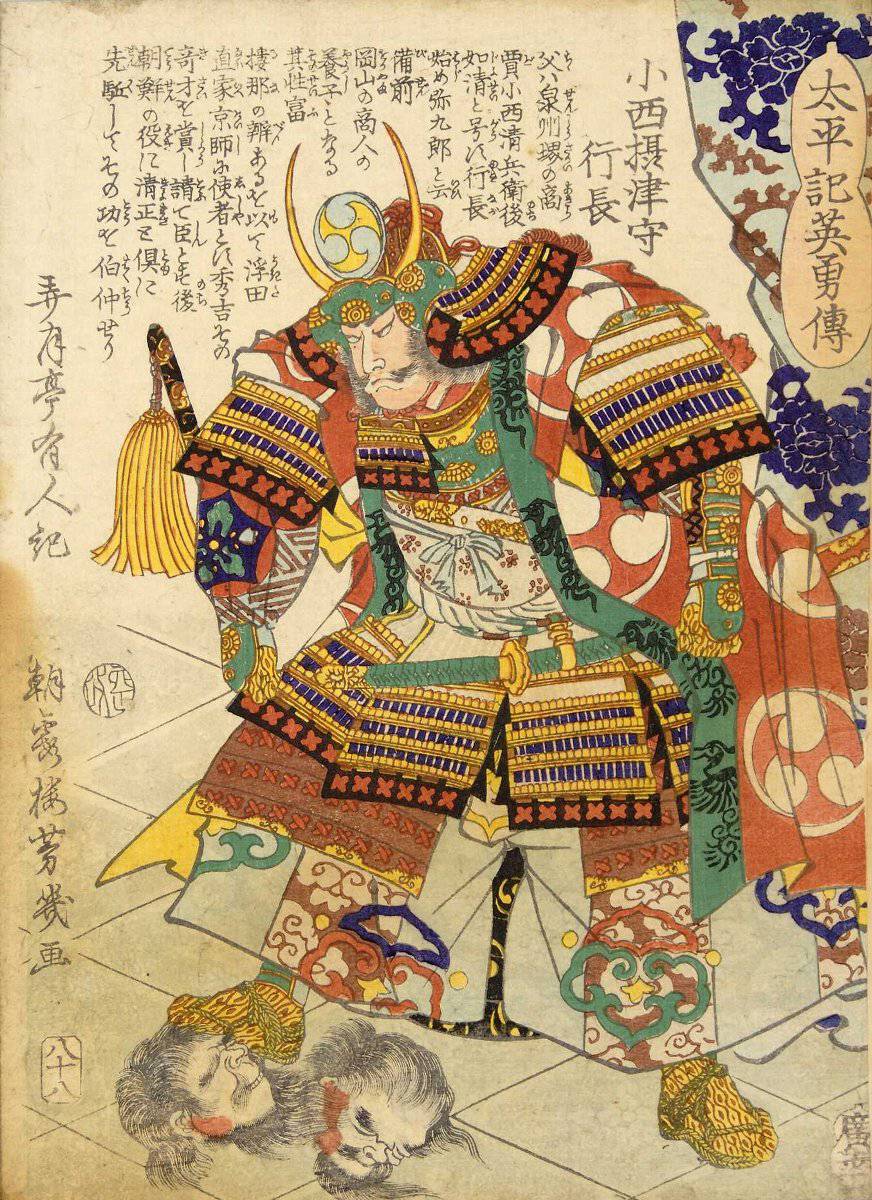 872x1200 Konishi Yukinaga (Dom Agostinho) - 1st Division, Marshal of the Army, 19,000 troops, Red. Taken - OscarDiggs/oscardiggssa@hotmail.co.uk 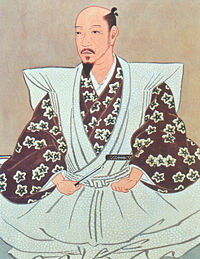 Katou Kiyomasa - 2nd Division, 23,000 troops, Blue. Taken - Tatankatonk/tatankatonk22@gmail.com  670x658 Kuroda Nagamasa (Dom Damiao) - 3rd Division, 11,000 troops, Green. Taken - Frionnel/phffernandes@gmail.com 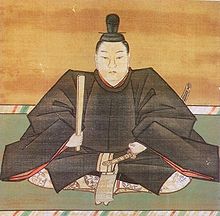 Shimazu Yoshihiro - 4th Division, 14,000 troops, Light Blue. Taken - Gantolandon/gantolandonsa@gmail.com 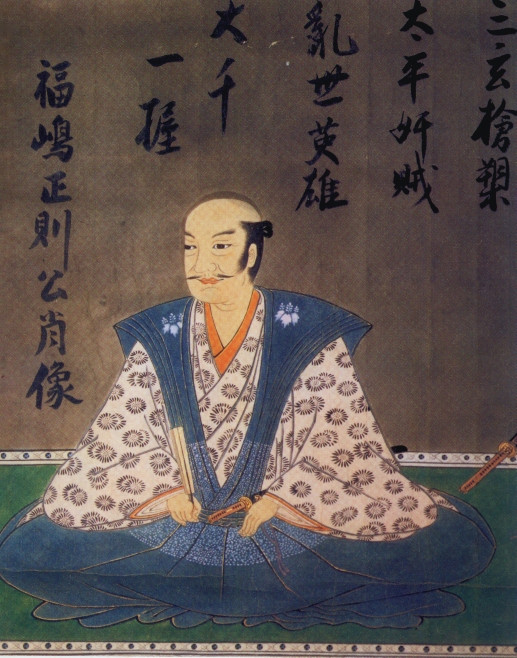 517x658 Fukushima Masanori - 5th Division, 25,000 troops, Purple. Taken - A RICH WHITE MAN/moodinconsistency at google mail 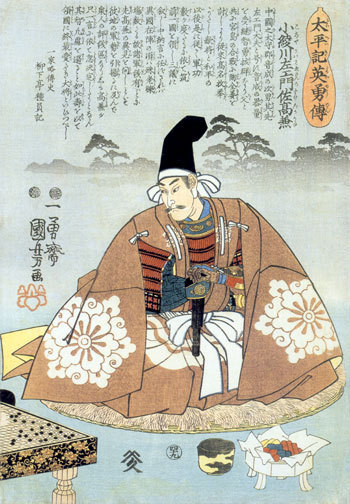 Kobayakawa Takakage - 6th Division, 16,000 troops, Brown 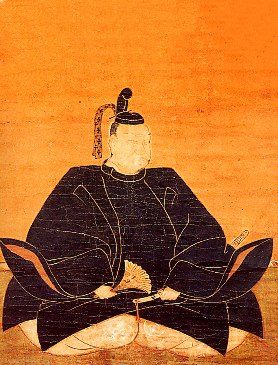 Mori Terumoto - 7th Division, 30,000 troops, Pink. Taken - Takanago/ktakanago@gmail.com 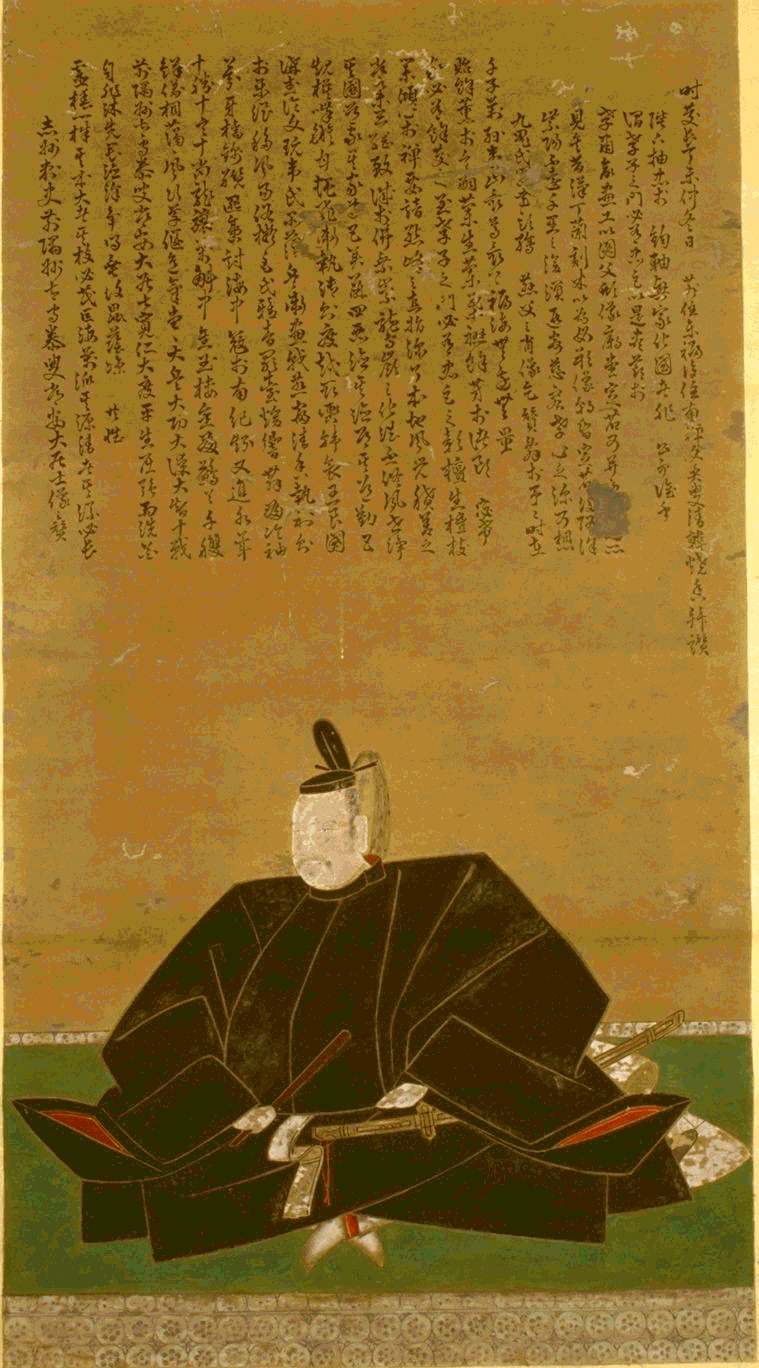 759x1368 Kuki Yoshitaka - Admiral of the Navies, 500 warships (with more in reserve), Umber Joseon  Seonjo - 14th King of Joseon since 1567, his reign has seen few bright spots amongst political instability and corruption. Taken - ZearothK/zearothk@trioptimum.com 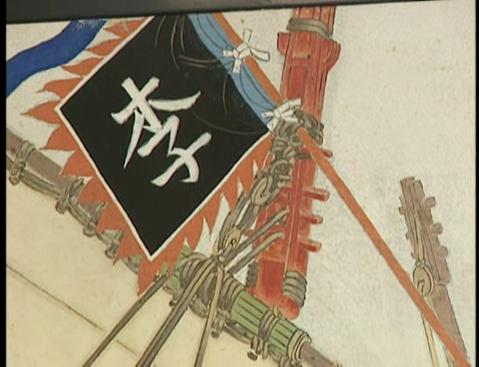 The Joseon forces, seeing the constant warfare tearing Japan apart for the past few decades, have allowed thoughts of peace to override any suggestions for a military reorganization. But with the samurai only a few dozen leagues away, it may be too late now. The Joseon generals will have to rely on local militia and fortress garrisons to supplement their mobile cavalry divisions. On the seas, however, Yi Soo Sin has the makings of a strong fleet, possibly stronger than the Japanese. 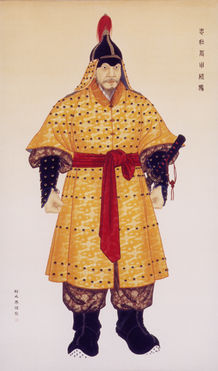 Sin Rip - General of Hwanghae, 5,000 troops, Haeju  Jeong Bal- General of Gyeonsang, 8,000 troops, Gyeongju  1090x1602 Kim Si-Mim - General of Jeolla, 7,000 troops, Jeonju 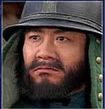 Kim Myeong-Won - General of Pyongang, 8,000 troops, P’yongyang. Taken - Rogue0071/rogue0071sa@gmail.com  Prince Gwanghae - General of Hamgyong, 10,000 troops, Hyesan. Taken - Enjoy/sw_faulty@hotmail.com  Kim Chung-seon - General of Gangwon, 7,000 troops, Wonju. Taken - Slaan/wlyle at indiana dot edu 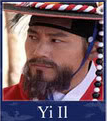 Yi Il - Marshal of Gyeonggi, 10,000 troops, Seoul. Taken - Ramba Ral/borisstukov at aim .com 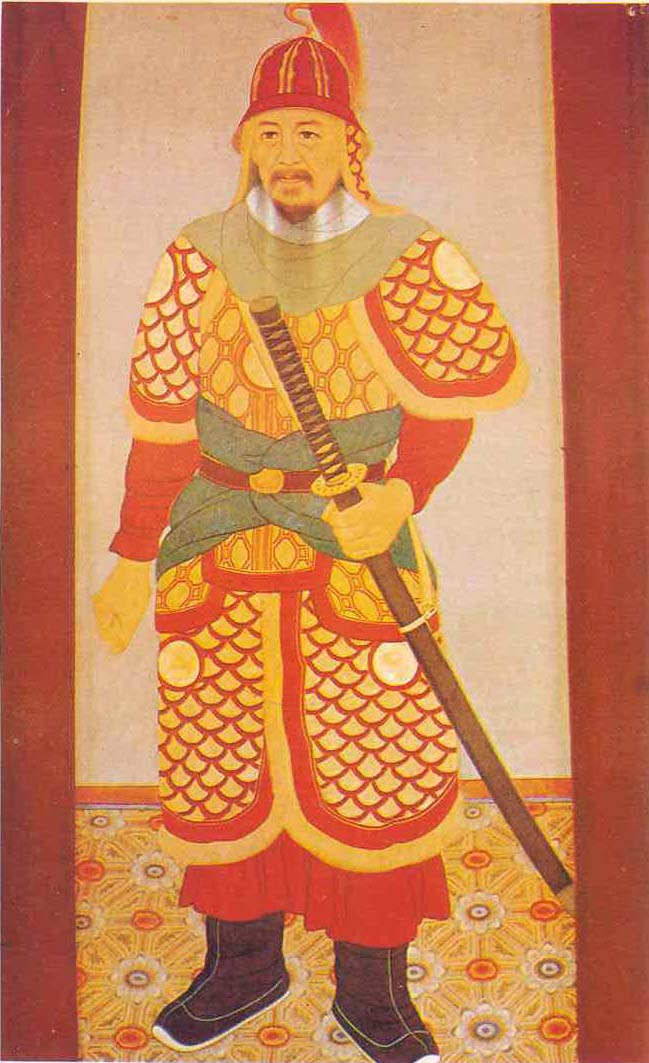 649x1063 Yi Soo Sin - Admiral of the Navies, 150 panokseon ships, 20 geobukseon (turtle ships), Yeosu. Taken - Gorgo Primus/messedupjoe @ hotmail Ming China 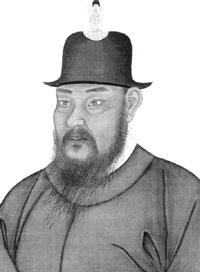 Li Rusong - Exceptional commander, currently en-route to deal with the Mongol rebellion. 2,000 personal troops. Taken - Fall Sick and Die/ccferrara@gmail.com 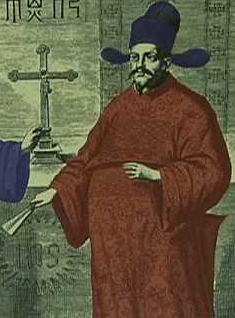 Li Yingshi - Current commander of Dalian, a large port on the Liaodong peninsula, very close to the border of the Yalu River. 1000 troops.  Admiral Chen Lin - Defender of the Ming coast. Weihai, 50 ships. Taken - Maximo Roboto/maximo DOT roboto at gmail you know the rest Southern Barbarians  Alessandro Valignano - Visitor of Missions for the Society of Jesus in the Indies. A very influential man, who oversees all of the Jesuit missions in the Far East, from India to Japan. Although Hideyoshi has decreed there is to be no more Christian missionary activity in Japan, the law has been little enforced and often flouted, and the Jesuit-owned port of Nagasaki grows greater by the day. Taken - Cardinal Ximenez/dallasjhaugh AT gmail dot com  Gómez Pérez Dasmariñas - Governor General of the Spanish East Indies, which encompass the Philippines, Marianas, and Carolinas islands. Representative of the august monarchs of the Iberian Union. Many forces look for the aid of Portuguese and Spanish merchants, in the form of cannons and guns, but time will tell whom he might deign to aid, though obviously not without something in return. 1200 troops, Manila. Taken - Sniper4625/Sniper4625@gmail.com Initial Disposition of forces as of April 1, 1592  Let there be war!
|
|
|
|
Gómez Pérez Dasmariñas Sniper4625@gmail.com I bring civilization in one hand, cannons in the other. (I am very strong.)
|
|
|
|
Kim Myeong-Won rogue0071sa@gmail.com
|
|
|
|
Konishi Yukinaga (Dom Agostinho) oscardiggssa@hotmail.co.uk
|
|
|
|
Kato Kiyomasa tatankatonk22@gmail.com
|
|
|
|
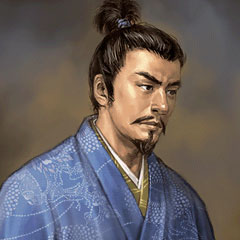    毛利 輝元 Mori Terumoto, Commander of 7th Division ktakanago@gmail.com
|
|
|
|
Fukushima Masanori. moodinconsistency at google mail
|
|
|
|
I am Toyotomi Hideyoshi vanhelsing420@gmail.com
|
|
|
|
Yi Sun-Sin Corea rules the waves! (messedupjoe @ hotmail)
|
|
|
|
 Don Gómez Pérez Dasmariñas, Governor General of the Spanish East Indies Diplomatic missives to the Iberian Union will now be heard. I invite those who would commerce with us, regardless of nationality, to contact me at their earliest convenience.
|
|
|
|
Calling Alessandro Valignano dallasjhaugh AT gmail dot com
|
|
|
|
Calling Yi Il borisstukov at aim .com
|
|
|
|
Ming commander Li Rusong, ccferrara@gmail.com
|
|
|
|
Admiral Chen Lin of the Ming maximo DOT roboto at gmail you know the rest
|
|
|
|
Kim Chung-seon - General of Gangwon, 7,000 troops, Wonju wlyle at indiana dot edu We shall not fall to the Eastern and Southern Barbarians!
|
|
|
|
|
Prince Gwanghae - General of Hamgyong, 10,000 troops, Hyesan sw_faulty@hotmail.com
|
|
|
|
Shimazu Yoshihiro - 4th Division, 14,000 troops, Light Blue gantolandonsa@gmail.com
|
|
|
|
For the Aid & Edificaton of the Honorable Generals of Chosun and Nifon, A Topografic Map of the Environs of the Korean Peninsula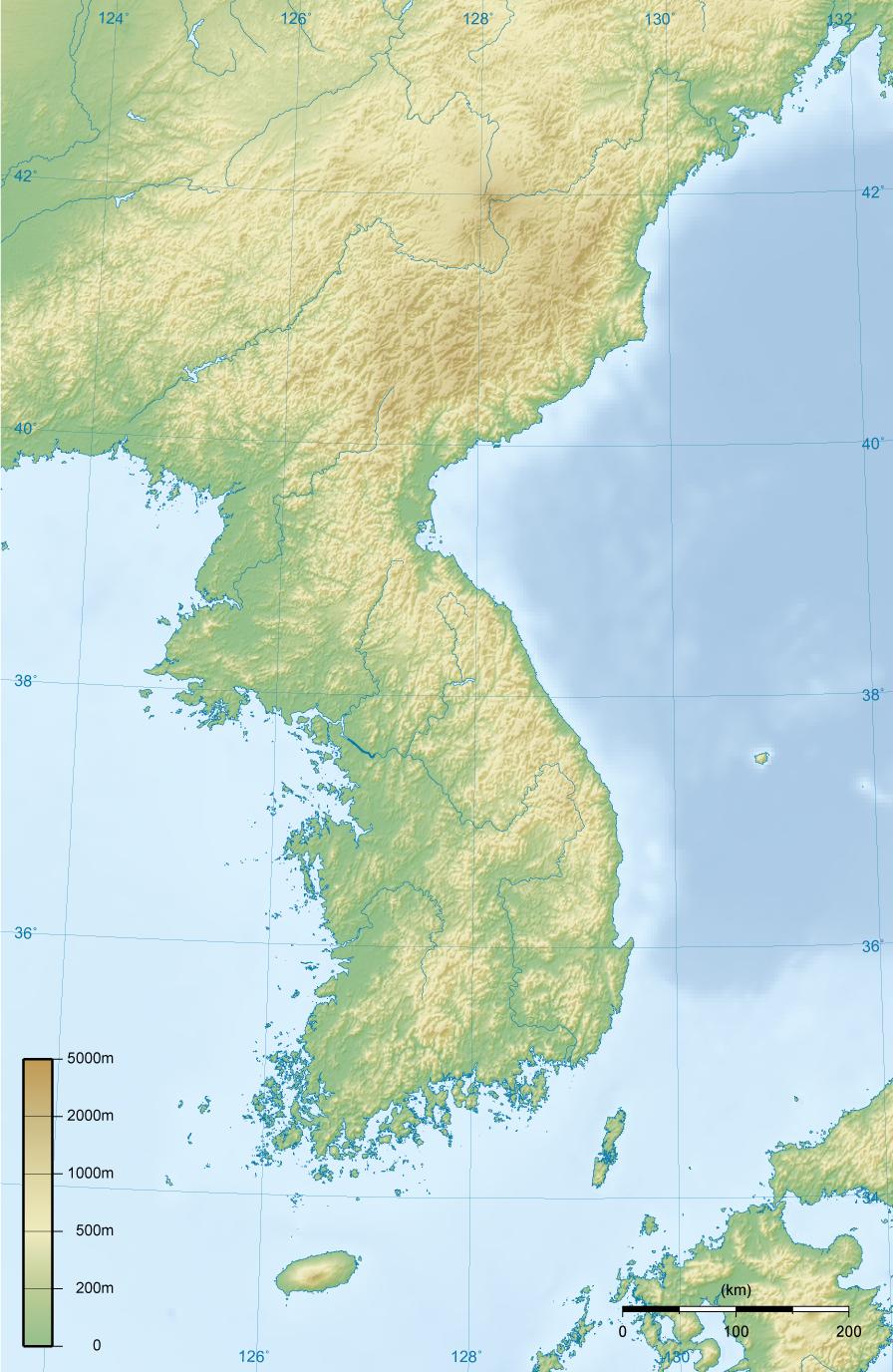
|
|
|
|
I am King Seonjo of Joseon. Please don't coup me. zearothk@trioptimum.com
|
|
|
|
Kuroda Nagamasa 670x658 phffernandes@gmail.com
|
|
|
|
Prince Gwanghae, General of Hamgyong To all Generals of the Joseon armies: My lords, I propose the following timetable for establishing a larger standing army via the mobilisation of garrison forces. The four northern armies adhering to this plan and sending constant streams of reinforcements to the four southern armies would ensure complete victory over the disgusting cockroaches threatening to scurry ashore and sully the court of my royal father with their foul presence.  1159x380 In the first month (and every six months thereafter): One third of all garrison troops in the castles and cities are requisitioned by the field armies and are trained for three months by our veterans. They are supplied and paid by taxes from their home cities and kept in their own regiments to improve morale and cohesion. They are replaced by conscripting men of fighting age who are unemployed, vagrants, paupers, and other refuse of society, who are to be trained by the remaining garrison forces. In the second month (and every six months thereafter): A second third of the garrison troops are requisitioned and begin their first month of training while the first third are in their second month of training. Replacements are conscripted. In the third month (etc): The last third of the garrison troops are requisitioned and the first third train for a third month. Replacements are conscripted. In the fourth month (etc): The first third of the original garrison troops are sent to the front line to fight for three months. The first third of conscripted garrison replacements, with three months of basic training under their belts, are requisitioned by the field army to be trained for a further three months. Replacements are conscripted. In the fifth month (etc): The second third of the original garrison troops are sent to the front line. The next batch of conscripts are requisitioned. Replacements are conscripted. In the sixth month (etc): The last third of original garrison troops are sent to the front line. The last batch of "original" conscripts are requisitioned by the field armies. Replacements are conscripted. In the seventh month (etc): The first third of original garrison troops return from the front line, are demobilised, paid off, and return to civilian life. The first third of original conscripts arrive at the front line to replace them. A new cohort of conscripts are taken from the garrison forces of the castles and cities. The entire process begins anew. The armies of Joseon are thus, after six months, permanently increased in number by the entire garrison force.
|
|
|
|
Kim Chung-seon, General of Gangwon A well-thought out plan, my new-found Prince, but as a former Japanese general serving under Oda Nobunaga and Toyotomi Hideyoshi I must advise against this policy. These great Shoguns were able to do what no other could because they knew the hearts of their soldiers: a well-trained professional military can destroy any number of conscripted soldiers, who are more liable to flee than fight like a true Warrior. By relying on conscription policies like this we drain our greatest resources: our supplies. Our Navies have long and storied histories of turning Japanese raiders time and again and they shall surely continue to do so. Thus, any invasion force will be cut off from its supply lines- they will have to forage off of our land and use the weapons of our fallen as theirs break against our fortresses. We shall stand little chance in open battle against the Japanese warriors as it stands, but by hoarding our supplies in Central and Northern cities and forcing our peasants to work on producing weapons of war can we out last the invaders. This plan of yours would have us starve alongside the Japanese as we destroy our productive workforce in battle. Let us have our Southerly armies work on delaying actions, burning our fields as they go while the Northern armies use limited conscription and intense training to bolster our forces. Then, once the Japanese are weak and demoralized can we strike in open battle.
|
|
|
|
|
I think we have enough people for us to begin! Newcomers, feel free to jump in an empty slot! TURNS FOR APRIL ARE DUE IN 30 HOURS - 6:00 PM, Mountain Time (GMT -7), 12/21. The sooner you email them to me, the sooner the turn goes up! TURNS FOR APRIL ARE DUE IN 30 HOURS - 6:00 PM, Mountain Time (GMT -7), 12/21. The sooner you email them to me, the sooner the turn goes up!
|
|
|
|
    毛利 輝元 Mōri Terumoto, Commander of 7th Division Taikou, I would like to thank you for giving me the honor of leading one of the divisions that is leading this invasion. I assure you that my men, your 7th Division, shall not disappoint. Upon the honor of my family, the Mōri clan, and the honor of your rule, I pledge to do my utmost to bring glory and victory. Should I fail, death shall be my punishment. Currently my men, all 30,000 of them, are here in Tsushima preparing for the upcoming war. As the largest of your divisions, we pledge to give you the largest of your victories. When we land in Joseon, the enemy will not know what hit them. We are battle-hardened. They are not. We are unified and organized. They are not. We are wisened by a whole era of warfare, tactics, and strategy. They are not. This is not to say that there will not be challenges. Challenges and difficulties are present in any campaign, and they will no doubt rear their head here. But it is our duty, as commanders, to overcome these kinds of things. We will be far from home, so I am taking steps to ensure that my men remain well-fed and supplied. The enemy navy is formidable, but I put my trust and faith in our own to fight them and keep us safe. From then on, it is my duty to fight, to obey the marshal's orders, and to achieve victory. I pledge to do my very best, and I assure you that I will not fail.
|
|
|
|
Konishi Yukinaga, Commander of the First Division, Marshal. In preparation for the coming invasion, Konishi prepares himself not only physically through intense sparring, but also mentally through the writing of poems. By the sword, my liege Korea will fall, inevitably The masses will bow. As the sun, eastward, Rises in the morning sky, Shall our land rise, new, A bright dawn guides us forward, As the tide washes them away. Our enemy, north, Proud and strong, as the tiger, Soon tamed, like a dog.
|
|
|
|
edit: nvm this is my character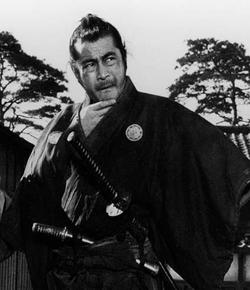 Mysterious Unknown Wandering Ronin, Alias "Kuwabatake Sanjuro" ~when asked for his name he peers at a mulberry bush and answers "Kuwabatake Sanjuro"~
|
|
|
|
Prince Gwanghae, General of Hamgyong To Kim Chung-seon, General of Gangwon: My lord, I am pleased that my despatch reached you and that you have sought to improve upon the plans I submitted, plans which I will now defend not because of any sense of pride I have over having developed them but simply because I believe them to be the best means by which we drive all rats with the ill-sense to swim to the lands of Joseon back into the sea. The exact methods by which generals facing abovesaid rats kill that rabid vermin is, of course, entirely up to them. As one of the beneficiaries of the reinforcements I propose to send, how you dispose of the troops will be up to you. I will not attach any demands to use certain strategies and tactics with them. The strategy you proposed sounds like a very good one and I will be overjoyed when the rats are all stamped upon by your armoured boot, spilling their plagued entrails across the sand of our kingdom's beaches. I was exhausted when I wrote the aforementioned despatch and had no time to expand upon the many advantages I believe it has, to whit: - Bringing new troops to the front every month ensures very fresh replenishments who will have a most easy time slaying the pock-riddled vermin from the pathetic islands of Nihon who must stay constantly in combat, wearing themselves down, in a righteously hostile land - Sending old troops away after three months ensures broken units do not infect the reinforcements with any unfounded sense of unhappiness over any marginal setbacks Joseon encounters on its march to inevitable victory - Giving conscripts a deadline by which they will return home will cause the notion of desertion to flee from their minds - Using the unemployed, vagrants, paupers and other refuse will give these potential bandits and malcontents purpose in life, and paying them good wages will prevent them turning to banditry, all of which will ensure a strong economy and devotion to the king upon their return I look forwards to further correspondence.
|
|
|
|
黒田 長政 Kuroda Nagamasa, 3rd Division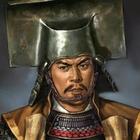 Taikou, you gave me the honor of leading a division in this noble undertaking i swar by my honor as a warrior that we shall not disappoint you. After all, this is Kuroda Nagamasa speaking, the greatest samurai in all of Japan, and though my division is still small, my men are veterans of unquestionable skill, loyalty and honor. Give us the direction and the 3rd division will conquer. That said, the Chosen dogs will not give up without putting a fight, especially with Ming at their side. If we are to conquer the entirety of the Middle Kingdom, we will need the aid of the men from the far west and the trade they bring. I can only ask that your Greatness stabilish closer ties with them, as well as continue to protect those among your vassals that adopted the new faith.
|
|
|
|
 Mysterious Unknown Wandering Ronin, Alias "Kuwabatake Sanjuro" ~Sanjuro is seen wandering through a port town in the south, he notices all the soldiers around and disappears into a dark restaurant.~
|
|
|
|
    毛利 輝元 Mōri Terumoto, Commander of 7th Division It is interesting that you call yourself the greatest samurai in all of Japan, Kuroda. There are a great many number of men that would try to claim that title. I don't mean to insult you, as you must be a great daimyo indeed to be chosen to lead one of the Taikou's divisions. But, it is interesting that you are so bold to claim that you are the best, out of all the samurai in Japan. So I propose a friendly little wager, if you are up for it. Let us see which one of us can kill more of the enemy on the battlefields of Korea. Surely that would be a good measure of how skilled of a samurai we are. What do you think of this offer? Do you accept this bet? Also, Taikou, I would like to report more on the state and readiness of my army. We have many samurai, hardened from these many years of battle. Among these we have many expert horsemen, archers, swordsmen, and so on. Their expertise in battle, their deadly swiftness, and their cold steel shall devastate their inferior Korean counterparts. Additionally, our peasant ashigaru forces are just as deadly. While they might not be masters of battle as our samurai are, their powerful guns mean that they do not need to be. Even in the hands of a peasant, a gun instantly makes a man just as powerful, if not even moreso, than a veteran archer. These decades of constant warfare have taught us how to compose the best armies in the world, and I am proud to be leading one of them.
|
|
|
|
 Ch'en Lin, Admiral of the Imperial Navy Clearly strange machinations are afoot as foreign barbarians scheme. I hereby petition the Admiralty to begin preparations to keep the ocean forces of the Son in Heaven in tiptop condition, ready to protect the coasts of the Empire of the Great Ming. Recruitment and acquisition of more ships for a northern defensive fleet must be undertaken, marines trained and equipped, and communications with our counterparts among the Joseon established. Stay vigilant against the eastern hordes!
|
|
|
|
 Don Gómez Pérez Dasmariñas, Governor General of the Spanish East Indies To the Spanish Crown posted:
|
|
|
|
黒田 長政 Kuroda Nagamasa, 3rd Division Terumoto, i feel honored to be challenged by another great lord, but do not think i that i can't see the advantages you and your thirty thousand have. Furthermore, it is through the seven virtues that you measure the value of a samurai, not by battles alone. As such, i am afraid i must decline this bet.
|
|
|
|
I will join as: Kuki Yoshitaka - Admiral of the Navies, 500 warships (with more in reserve), Umber My email is PropositionJoe.SA@gmail.com
|
|
|
|
    毛利 輝元 Mōri Terumoto, Commander of 7th Division Very well, Kuroda. There are many ways to measure the greatness of a samurai, and if you wish to measure it through virtue then I cannot challenge that. I wish you and your men luck in your future endeavors. May your future victories be plentiful and honorful.
|
|
|
|
.svg.png) 220x220 島津 義弘 Shimazu Yoshihiro, Commander of the Fourth Division Provided we all cooperate, there will be plenty of victories for everyone. Our discipline, military tactics and kiai is clearly superior, constantly tempered by the numerous struggles we faced in our homeland. Our enemies may be better armed, but even a greatest weapon is nothing when wielded by a coward or a weakling. Koreans grew fat and decadent. The sorry state of their armies is an insult to the art of war. We need to show them the proper fighting spirit. Hopefully, these who survive will learn to spend more time bettering themselves, and less in pursuit of luxury and wealth. Gambatte!
|
|
|
|
I'll take Kim Si-Min non_Ay_mous (at) yahoo (dot) com
|
|
|
|
Turn 1 - April 1592 The Iberians -- Throughout East Asia, Spanish and Portuguese merchants are found, selling off some of their well-made cannons to both the Koreans and the Japanese, with the acquiescence of the Governor-General. A nice profit is made in selling muskets as well. -- On a ship returning to Acapulco in Mexico, Gomez sends a letter bound for the Iberian monarch King Philip II. No one is sure what is in it, but it will take many months for there to be any response. -- Alessandro Valignano scours the libraries of Nagasaki for texts on the Polish language, but is told by the confused acolytes that they have none, being very far from the Commonwealth. A few books on the language will be sent to him from the Universidad de San Ignacio in Manila along with one of the Polish acolytes, though. -- Valignano also finds some of the more physically capable acolytes and catechumens, and is seen speaking to them in private. No one knows what about, though, and it is only his reputation that prevents salacious rumors from taking ground. -- Finally, he pens a letter to the Ming Emperor Wanli, to be presented by fellow Jesuit Matteo Ricci, and sends it off. There is no response. -- The Taikou, pleased with his business with the Spanish, pens a letter offering the King of Spain protectorship over the Christian faithful of Nagasaki. But the King of Spain is far, and it will be a long while before word is received back. -- In Kyushu, a nameless rounin is seen wandering around, but while he strikes a figure, few men know anything about him, from his past, his name, or what he plans to do. Preparations For War -- In return for some of their weapons, the Iberians are given many trade freedoms by the Joseon court. The Portuguese and Spaniards take advantage of these, and soon huge amounts of wealth are traversing the seas between Manila, Busan, Macau, and Nagasaki. -- In Seoul, some of the muskets find their way to the court, where King Seonjo seizes upon the opportunity they provide him. Overruling some of his advisors, he conscripts 300 soldiers, providing a musket to each, and orders them to be trained as a Royal Guard in their use. But without Iberian help, it is very slow going. -- On Tsushima, the Daimyou meet in council to discuss various strategies. Many are spoken of, then discarded as too impractical or obvious. Over several days of debate, the Daimyou argue and fight over contingencies. At an outdoor cherry-bloom viewing, the final plan takes shape. The daimyou look at the map and smile. -- Mori Terumoto requisitions ever greater quantities of koku for his soldiers from his domains on Honshu. But as the largest Japanese division, he needs the supplies. 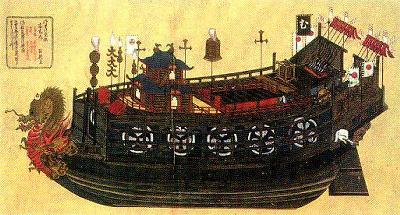 -- Kuki Yoshitaka, the Admiral of the Japanese fleets, orders a redesign of the Atakebune warship, so that they may make use of cannon. With the assistance of several Spaniards, they find a way to distribute the weight of the weapons and their ammunition in such a way, though they don’t hold as many cannon as the Admiral had hoped. Construction of the new ships can begin as soon as the shipwrights are ordered to. -- General Kim Chung-seon orders the villages of Gangwon to provide him with able-bodied men, and requisitions most of their supplies. The villagers, although afraid of a war trampling their fields, send a few men, but curse Kim’s name as he leaves them with almost no reserves of food. -- Admiral Yi Soo Sin splits his forces into two groups, a mobile scouting group and a larger coastal defense cohort. The larger stays in his command, while passing the smaller group to a sub-Admiral, Won Gyun. Yi explains that Won is not to put his ships into unnecessary danger. It is a warning the other man need not be told twice. -- In the North, Prince Gwanghae wastes no time bolstering his forces. He sends out a decree to the entire province, ordering a substantial portion of the garrison infantry to join his cavalry division at Hyesan. To prevent undermanning of the fortresses, the men are replaced by such outcasts and vagrants as can be found and conscripted. The people of the towns are worried they will be little better than bandits, however. -- Spreading some of his cavalry among the new arrivals, Gwanghae has them start basic drills. It’s a sad sight, with even the “experienced” soldiery having little idea of what they’re doing. Did they send him daughters when he asked for sons? It’s a spineless, pale, pathetic lot, who haven’t got a clue. Somehow, the Prince will make men out of them. -- Finally, the Prince extends and rebuilds portions of the line of watchtowers on the northern border. The war-loving Jurchen clans will find few holes in the defenses to raid through unseen now. -- In China, Chen Lin petitions the Imperial court for greater resources. The barbarians are right there! he says, but the court is too “busy” to attend to such small matters. The Mongols and the Taungoo are their priorities now, but they leave him to his own devices. -- Undaunted by the rebuff, Chen Lin rounds up another 17 ships to add to his fleet, and begins patrolling the entrance to the Bohai Sea and training his men. Having some experience already against wokou pirates, the men take to the training. 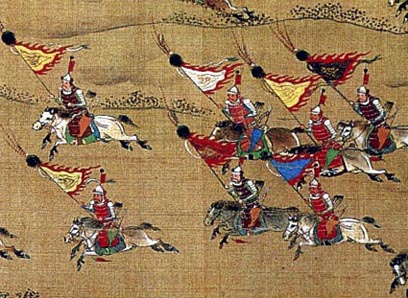 -- In the far West, Li Rusong begins recruiting more troops from the regional garrisons on his way to Ningxia. His force swells, and soon he has over 15,000 infantry, with over 4,000 cavalry as well. -- On the way, he takes to expounding Sun Tzu and his commentators to his officers. The lessons of warfare are helpful, and the instruction by the great tactician help them understand even the most esoteric passages. -- Furthermore, he writes a letter to the Ming court, concerning rumors of conflict. One of the court eunuchs reads the letter aloud, though not in the presence of the Wanli Emperor. A poem from the Tang-era poet Han Yu on patience seems to encapsulate the thoughts of the court well, and many applaud Li’s cultured disposition. The War Begins -- The mobilization orders of the rest of the Japanese divisions come, and tens of thousands of soldiers begin moving into thousands of transports. In what will be considered one of the logistical miracles of history, the Japanese are herded by their generals into ships, and there are remarkably few mix-ups. -- Shimazu Yoshihiro takes a smaller detachment from his division, and sails along the Eastern coast of Korea for a few days to Samcheok, a small fishing-oriented town. Landing in front of the town, he rides in front of the town and gives the last message of peace - should the magistrates (and by extension the King) aid the Japanese in their efforts, they will be left in peace. Should they refuse though, and not surrender, the officials will be put to the sword. -- The town magistrate, one Jo Su-Chang, is on the walls when the ultimatum is given. He is silent for a moment, until he balls his fists in anger. He refuses, and dares the Japanese to force their way through Korea. The Shimazu daimyou smiles at the challenge, and orders the assault.  -- The battle is swift, the 3 small Japanese cannons smashing a hole through the stone wall about the town, through which ashigaru and samurai pour through, bringing death to the defenders. At the end of the battle, 432 of the 700 defenders are slain, and 195 Japanese are wounded and dead. The first city has fallen to the Shimazu Daimyou! -- After the fight, the Japanese find Jo Su-Chang in his office, dead by his own hand. Undaunted, they make real the threat Yoshihiro had given and cut off the heads of Su-Chang’s deputies, placing them on spears about the still-smoking walls. -- A significant portion of the Japanese army, with escort, heads West from Tsushima, confounding the expectations of the Joseon Navy, who are patrolling in squadrons along the Southern coast. -- In a few days, however, they are found by Won Gyun’s mobile force of 25 panokseon and 3 geobukseon in the open waters on the way to Jeju. The sub-admiral, trying his best, makes a desultory attack. -- But on the open waters the Japanese ships show their greater maneuverability and speed, though those that are hit by the cannons suffer for it. Hundreds of fire arrows and dozens of hammer-thrown grenades fly around the admiral and his squadron, and quickly he flees back towards Yeosu, thinking of the orders Yi had given him. He leaves 4 crippled panoks, and worse, a flaming geobok. The Japanese lose 5 kobaya and 2 bune, smashed by cannon fire. -- Several days later, as the fleet reaches Jeju, the portion containing the division of Kuroda Nagamasa peels off. Landing at Seogwipo, the Daimyou demands the surrender of the garrison, lest war be brought onto the whole kingdom. The commander refuses, but after the first volley of musket fire kills many of the defenders (including the commander) the city surrenders. -- Still covered in soot from the gunpowder, Kuroda marches his men around the volcanic mount that dominates the island, until he reaches the city of Jeju two days later. Warned of his advance, the city is on guard. A small matter for the self-proclaimed greatest samurai of Japan! -- Taking a day to rest and build rudimentary ladders, Kuroda wakes the next day to begin the assault. The 800 defenders are bombarded by arrows and firebombs, though they bravely fight back with arrows and what can be thrown from the walls. Many attackers are struck down as they try to scale the walls with their ladders, but soon the fight takes to the walls. -- By the time the day is done, the main gates of Jeju have been thrown open, and the battle is over. 653 Japanese are wounded or dead, with the entire garrison (save 33 men who surrendered) dead. Kuroda is master of Jeju now. -- Forbidding looting and rapine, Kuroda begins a Sword Hunt on Jeju, taking what weapons as can be found from the people of the island. Hundreds of spears and swords are confiscated and brought to Kuroda’s feet. -- On the seas, Kuki Yoshitaka begins a blockade of the Korean coast between Yeosu and Busan, forcing Yi Soo-Sin to restrict his movements. Several small engagements of isolated patrols occur between the two fleets, but this close to the coast the Korean navy has the strict advantage. 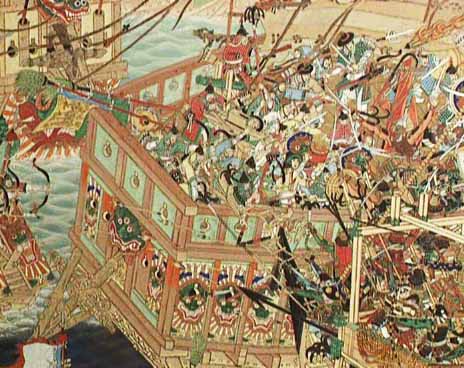 -- On his way back to Yeosu, Won Gyun encounters a large patrol of Japanese ships. Unsure of what to do, he decides to force his way through the cordon. His ships are swarmed by a wave of Japanese wood and boarders. One by one the ships are stopped in the water or destroyed by fire. When he returns to Yeosu, it is with only 7 panoks and 1 geobok ship left, the others having sunk beneath the waves. -- The Japanese are stymied at their attempts to close the cordon further. Admiral Yi’s forces dance between Japanese formations, disappear between islands, attack at a moment, but refuse to break through. At the end of the month, only 4 panoks are sunk, in return for 18 japanese ships.  -- This blockade allows the 1st and 2nd Divisions, under the Marshal Dom Agostinho Konishi and Katou Kiyomasa, to land and take Ulsan with little problem. Both men have strict orders for their troops -- no looting, no rape, nothing to assault the civilians. Several examples are made of those who flout the law, their bodiless heads keeping watch over the divisions. -- The Marshal strikes south, then besieges and takes Busan over the course of 3 days. The port is the easiest place for the Japanese to sail supplies into, and soon dozens of transports a day are moving rice and weapons to Busan. -- Katou takes his soldiers and strikes north to Gyeongju. Jeong Bal, unwilling to face the Japanese in open battle, orders his men to man the walls of the city. The siege of Gyeongju begins! -- Back in the West, the massive fleet of transports begins to split apart as it reaches the Western coast of Korea. Mōri Terumoto aims for Incheon, Fukushima Masanori for Gunsan, and Kobayakawa Takakage for Boryeong. -- The landing at Boryeong is chaotic, with no clear leadership set by the daimyou Takakage. But the order from the Marshal is clear: the city is to be taken! The army smashes the defenders, but not without taking almost 1350 casualties. -- Fukushima’s landing at Gunsan is more ordered, but something is seen by the man’s retainers in his eyes. It is the glint of evil, some whisper. Their thoughts would be justified shortly. -- A small fishing village, Gunsan gives up when the fleet arrives. When Fukushima disembarks, his eyes wander over the horizon. He asks a villager for the way to Iksan. When the poor man points East, Fukushima unsheathes his blade, and cleaves the man’s head from his body. Fukushima wipes the blood off his sword, and points to Iksan. He says this: “Iksan, then Jeonju. Take what you will.” -- The 5th Division takes their commander’s words to heart, and begin to blaze a trail of rapine and plunder on their way to Iksan. At the walls of the city, Fukushima does not even give those inside the chance to surrender, beginning a bombardment of the city as soon as he can. But the defenders fight with the knowledge they cannot surrender, and push back hard. Fukushima’s soldiers smash open the main gates, but the fighting does not end there. 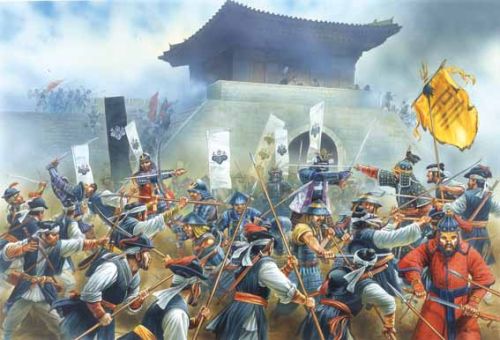 -- Iksan falls, street by street, as each isolated unit of the defenders dies to the man. Fukushima’s soldiers may have been left hungry by the sea trip, but now they glut themselves on the defeated city, raping and pillaging whatever they can. 4 days of looting and murder end with Iksan a shattered wreck, smoking and silent. Bodies line the streets, blood flows like water, and the division is expanded with taken women and precious goods. -- After sating themselves, the soldiers begin their march to Jeonju. However, this period of plunder has left the army in Jeonju, under Kim Si-Mim, the time to escape the city, and make their way to Namwon. Fukushima curses the slip, but ends the month besieging Jeonju and its 2000 defenders. -- Across Korea, as word of the invasion spreads, monks and civilians grab what weapons they can and begin to band together in “Righteous Armies.” Usually 2-3000 men in size, The Gates of Seoul -- The army of Kim Myeong-Won marches south to Seoul, recruiting more on their way. By the time of his arrival, many officials of the court are in shambles from worry: is he here to coup the government? is he in league with the Japanese? the Ming? Why has he left Pyongyang undefended? -- His first action on his arrival, coming unarmed to the court to explain himself, seems to defuse most of the tensions. He knows he left his post, but he figured that loyalty to the country trumped an outdated strategic plan. The King is somewhat perturbed, for that plan was meant to prevent any one general from having too much power, but events could prove Kim Myeong-Won right. -- Mōri Terumoto lands at Incheon, assaulting a strong position. Though his men have been on sea rations for over 2 weeks now, the extra supplies mean they are still strong and hale. Incheon falls the evening of April 23. -- When word of the assault reaches Seoul, the entire court erupts into hysteria. Officials and administrators flee the city as fast as the King’s horses can take them. It is only a speech, made by Seonjo himself, concerning the loyalty of all men to the nation and the crown, that prevents the soldiers from following. 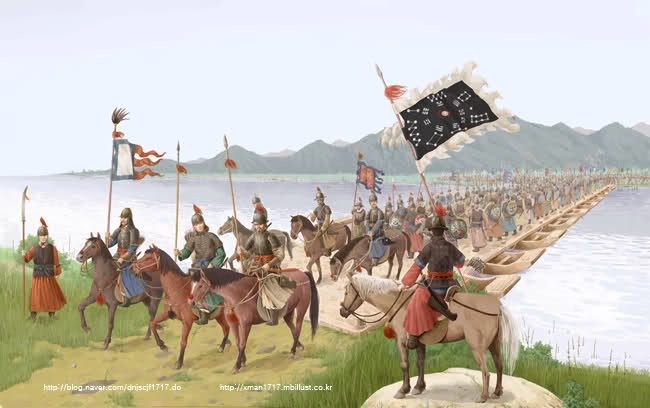 -- The Marshal, Yi Il, takes his division and strikes to hold off the Japanese advance as best he can. -- But it is clear that the Mōri Daimyou does not plan to stop at Incheon. The next day, April 24, he begins his race toward Seoul, dividing his forces to gain more speed. He is met the day after by Marshal Yi about 15 kilometers from Seoul, who has rallied the extra men from Kim Myeong-Won to help him. -- The Daimyou has his vanguard of 12,000 men, with arquebusiers, ashigaru and samurai. The Marshal has his 10,000, plus 3,000 reinforcements. -- Yi Il positions his men at the top of a tall hill, obscuring his numbers. When the Japanese vanguard arrive, they see a piddling force, and laugh at the joke. This is to be their opponent? The Daimyou wonders if he should wait, but his desire for Seoul quashes any sense of delay. 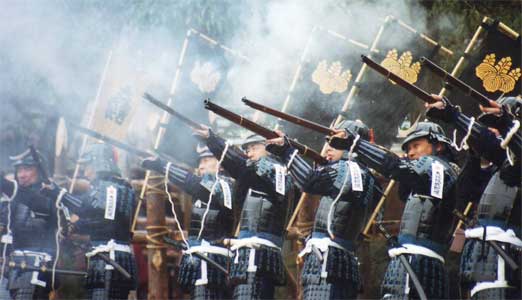 -- Without waiting for the rest of his division, Terumoto draws up his line, and advances. The Japanese make a strong accounting for themselves, advancing through a hail of arrows, until their volleys of shot begin to rip through the Koreans. -- As they reach the halfway point, Yi Il springs his trap. Thousands of cavalry charge down the slope toward the Japanese lines. The musketmen get a volley off, killing many, but they are unable to stop the charge. The armies collide in a storm of flesh, steel, and blood. -- A brutal melee develops. But for many of the Japanese, this state is not unknown to them, many of them being veterans of the incessant wars of the Sengoku Jidai. It is slow going, but the Koreans are pushed back step by step. It is the arrival of another regiment of the Japanese division that breaks the Koreans, sending them retreating back towards Seoul. -- Terumoto stands as victor over a costly battlefield. Over 3000 Japanese are dead or wounded. But Yi Il has it worse. Getting back into Seoul, he finds that only half the men he set out with returned. -- Terumoto spends the night recovering, sending men to find the wounded still missing, and recollecting the whole division. He curses himself, that his impetuous action will only fan the rumors of lesser men, that he is a middling general, unfit for such a command. He resolves to take Seoul, and throw the victory at the feet of his detractors. -- On April 25, Terumoto arrives at the gates of Seoul, only to find it filled with almost 20,000 Korean soldiers. Immeasurably frustrated at the sight, and at the sinking feeling in his gut of Seoul slipping out of his grasp, Terumoto begins a siege of the city, bombarding it day and night with cannon and arrow, and the Koreans respond in kind. Terumoto is resolved to take the city, come Hell or high water! Map of Dispositions, May 1 1592 A.D. 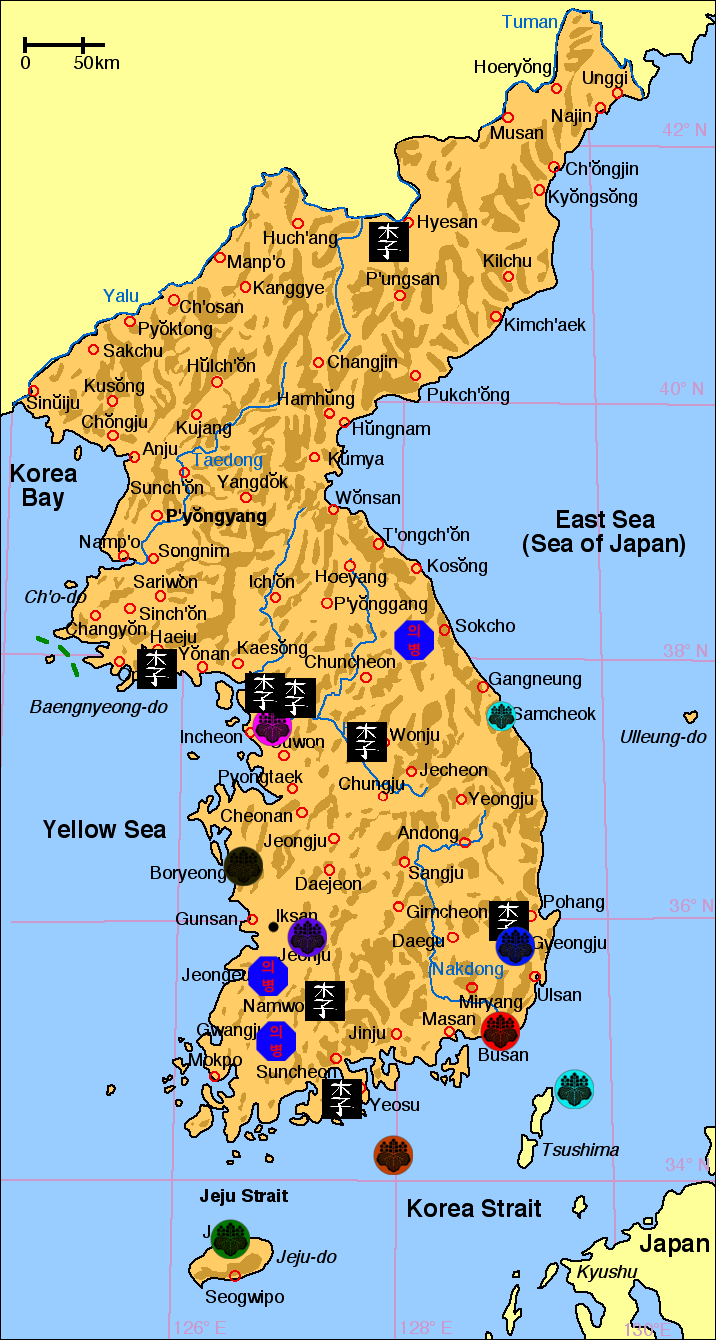 Righteous armies denoted by octagonal icons. Japan  872x1200 Konishi Yukinaga (Dom Agostinho) - 1st Division, Marshal of the Army, 18,653 troops, Red. Taken - OscarDiggs/oscardiggssa@hotmail.co.uk  Katou Kiyomasa - 2nd Division, 22,798 troops, Blue. Taken - Tatankatonk/tatankatonk22@gmail.com  670x658 Kuroda Nagamasa (Dom Damiao) - 3rd Division, 10,347 troops, Green. Taken - Frionnel/phffernandes@gmail.com  Shimazu Yoshihiro - 4th Division, 13,805 troops, Light Blue. Taken - Gantolandon/gantolandonsa@gmail.com  517x658 Fukushima Masanori - 5th Division, 23,998 troops, Purple. Taken - A RICH WHITE MAN/moodinconsistency at google mail  Kobayakawa Takakage - 6th Division, 14,657 troops, Brown  Mori Terumoto - 7th Division, 26,618 troops, Pink. Taken - Takanago/ktakanago@gmail.com  759x1368 Kuki Yoshitaka - Admiral of the Navies, 475 warships (with more in reserve), Umber. Taken - Proposition Joe/PropositionJoe.SA@gmail.com Joseon  Sin Rip - General of Hwanghae, 5,000 troops, Haeju  Jeong Bal- General of Gyeonsang, 8,000 troops, Gyeongju  1090x1602 Kim Si-Mim - General of Jeolla, 7,000 troops, Namwon. Taken - MadRhetoric/non_Ay_mous (at) yahoo (dot) com  Kim Myeong-Won - General of Pyongang, 8,000 troops, Seoul. Taken - Rogue0071/rogue0071sa@gmail.com  Prince Gwanghae - General of Hamgyong, 16,700 troops, Hyesan. Taken - Enjoy/sw_faulty@hotmail.com  Kim Chung-seon - General of Gangwon, 11,500 troops, Wonju. Taken - Slaan/wlyle at indiana dot edu  Yi Il - Marshal of Gyeonggi, 7,073 troops, Seoul. Taken - Ramba Ral/borisstukov at aim .com  649x1063 Yi Soo Sin - Admiral of the Navies, 128 panokseon ships, 18 geobukseon (turtle ships), Yeosu. Taken - Gorgo Primus/messedupjoe @ hotmail Ming China  Li Rusong - Exceptional commander, currently en-route to deal with the Mongol rebellion. 2,000 personal troops, larger garrison forces attached to deal with Mongols. Taken - Fall Sick and Die/ccferrara@gmail.com  Li Yingshi - Current commander of Dalian, a large port on the Liaodong peninsula, very close to the border of the Yalu River. 1000 troops.  Admiral Chen Lin - Defender of the Ming coast. Weihai, 67 ships. Taken - Maximo Roboto/maximo DOT roboto at gmail you know the rest
|
|
|
|
    黒田 長政 Kuroda Nagamasa Leader of the Third Division Commander of the Eight Tigers and Twenty-Four Riders Conqueror of Jeju-do A letter to his Excellency the Taikou posted:
|
|
|
|
    毛利 輝元 Mōri Terumoto, Commander of 7th Division Taikou, I have reached Seoul as planned. The plan to launch a bold sea strike at Incheon was a success. The Koreans did not know what hit them. Unfortunately, resistance has proven to be greater than expected. We ultimately decided to abandon the plan to assault Seoul, as it would have been much too costly. However, I can assure you that the city, along with Joseon's King, will soon be ours. The city is under siege, and it is only a matter of time before it falls. There is no doubt that the Koreans will attempt to regroup and remove our stranglehold on their capital. I will do my very best to ensure that it does not happen, and I will prove beyond the shadow of a doubt my wisdom on the battlefield, and your wisdom in choosing me to lead your 7th Division.
|
|
|



























